Provisional Entries for GCSE, AS and A level: Summer 2020 exam series
Published 11 June 2020
Applies to England
Provisional Entries for GCSE, AS and A level
Summer 2020 exam series
This report presents provisional figures for the number of entries for GCSEs, AS and A levels submitted by schools and colleges in England to exam boards by 14 April 2020 for qualifications which were to be taken in summer 2020.
Entries reflect the information submitted to exam boards at that time but numbers for final entries are always expected to vary to some degree. Additional variation in final entries for summer 2020 is possible in light of the cancellation of exams and the operation of alternative arrangements, which are outlined here.
Main trends
The main trends in provisional entries for GCSE and GCE (AS and A level) for the summer 2020 exam series are:
- GCSE entries increased by 2% this year, mostly due to an increase in entry for EBacc subjects. The increase corresponds with an increase of 3% in the size of the 16 year old cohort this year.
- The largest increases in EBacc entry numbers are in combined science, mathematics & English language.
- A level entries for the summer 2020 exam series decreased by 2% overall compared to last year, in line with a decrease in the size of the 18 year old cohort (which fell by 3%).
- The overall entry for AS in summer 2020 decreased by 26%.
GCSE entries
The overall entry for GCSEs in summer 2020 increased by 2% from 5,185,840 in 2019 to 5,281,745 in 2020.
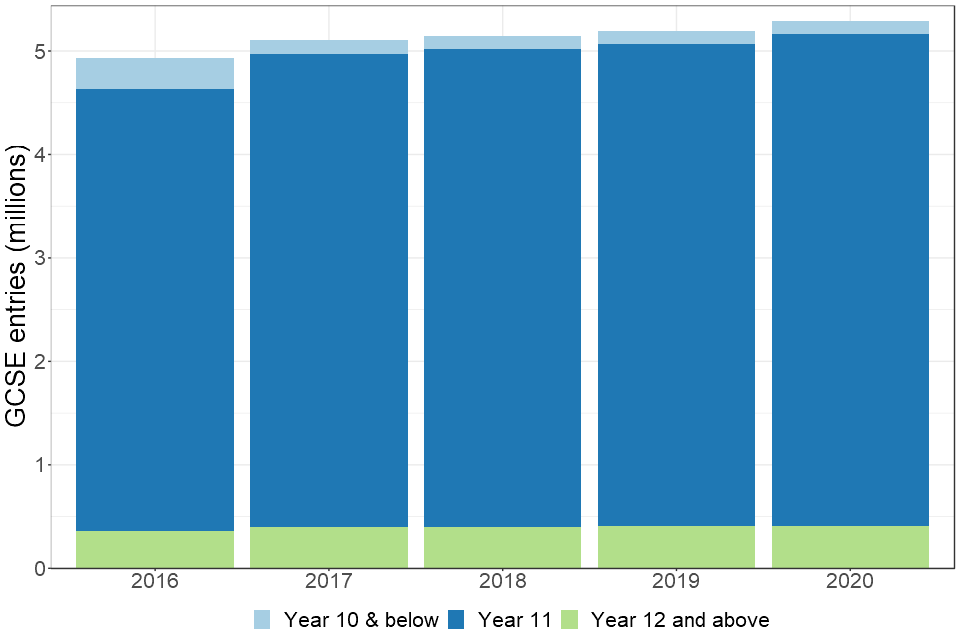
The majority of GCSE entries are from year 11 students, and it is the increase in year 11 entries this year that is responsible for the overall increase. It is likely that the reason for this increase is a larger cohort, since the size of the 16 year old cohort increased by 3% in 2020 compared to 2019 according to ONS population estimates (624,590 compared to 607,496).
| Exam Series | Year 10 & below | Year 11 | Year 12 and above | Total |
|---|---|---|---|---|
| 2016 | 297,340 | 4,277,635 | 354,495 | 4,929,475 |
| 2017 | 134,300 | 4,573,175 | 390,550 | 5,098,020 |
| 2018 | 123,350 | 4,619,275 | 393,870 | 5,136,495 |
| 2019 | 127,240 | 4,657,115 | 401,480 | 5,185,840 |
| 2020 | 124,310 | 4,756,135 | 401,300 | 5,281,745 |
The increase in entries for GCSE was mostly due to a rise in entries to EBacc subjects. Entries in EBacc subjects increased by 90,405 (2%) and entries in non-EBacc subjects increased by 5,505 (1%) compared to 2019.
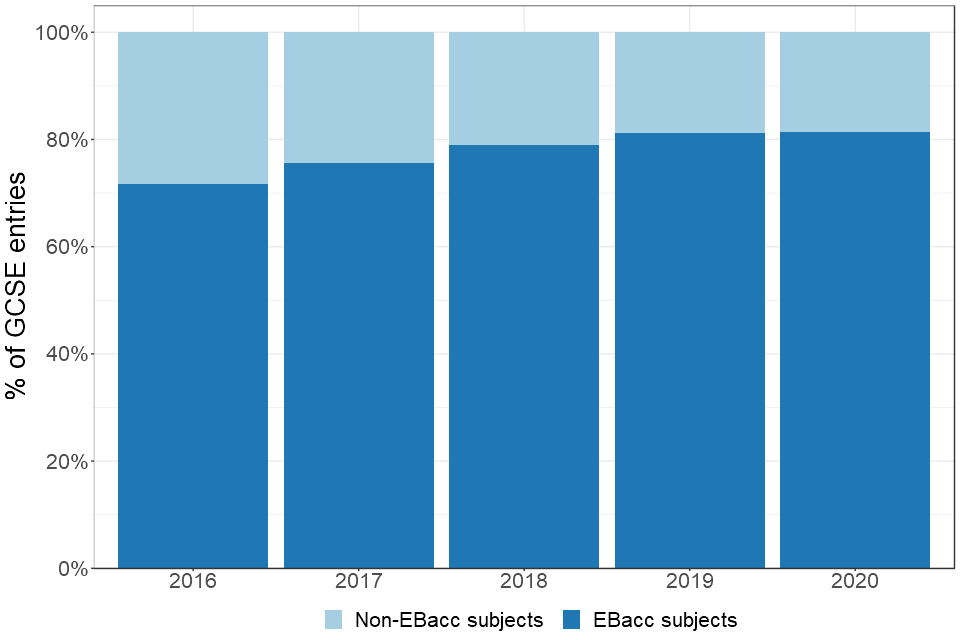
| Type | 2016 | 2017 | 2018 | 2019 | 2020 |
|---|---|---|---|---|---|
| EBacc subjects | 3,528,305 | 3,850,805 | 4,054,475 | 4,206,700 | 4,297,100 |
| Non-EBacc subjects | 1,401,170 | 1,247,220 | 1,082,020 | 979,140 | 984,645 |
| Total | 4,929,475 | 5,098,020 | 5,136,495 | 5,185,840 | 5,281,745 |
Change from previous year in GCSE entries for EBacc subjects
The graph and table below show the change this year in entries to EBacc subjects compared to 2019. The subjects are ordered by total entry size in 2020 (largest to smallest).
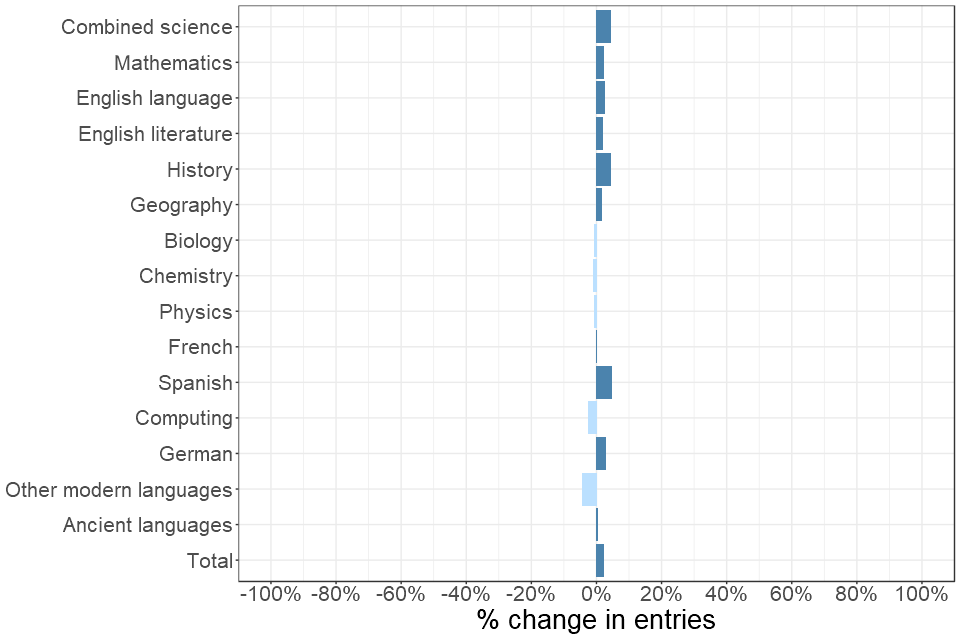
| Subject grouping | June 2019 | June 2020 | % change in entries |
|---|---|---|---|
| Combined science | 786,830 | 820,270 | 4% |
| Mathematics | 742,245 | 757,235 | 2% |
| English language | 729,315 | 746,705 | 2% |
| English literature | 551,205 | 561,315 | 2% |
| History | 264,680 | 275,910 | 4% |
| Geography | 253,125 | 256,805 | 1% |
| Biology | 167,525 | 166,635 | -1% |
| Chemistry | 160,980 | 159,760 | -1% |
| Physics | 159,555 | 158,395 | -1% |
| French | 125,700 | 125,770 | 0% |
| Spanish | 101,080 | 105,840 | 5% |
| Computing | 78,080 | 76,180 | -2% |
| German | 42,175 | 43,390 | 3% |
| Other modern languages | 32,035 | 30,685 | -4% |
| Ancient languages | 12,170 | 12,215 | 0% |
| Total | 4,206,700 | 4,297,100 | 2% |
There have been increases in entry numbers in many EBacc subjects, particularly combined science, mathematics and English language. The largest proportional increases were in combined science, history and Spanish.
In combined science, the number of entries in 2020 increased by 33,440 compared to 2019. The total decrease in entries to single sciences (biology, chemistry and physics) was 3,270. There are likely to be a large variety of reasons why entries to combined science have increased, including the increase in the 16 year old cohort and a possible small shift from single sciences, as well as other factors.
Modern foreign language entries have increased by 2% (from 268,955 to 275,000). German and Spanish increased (by around 3% and 5% respectively) and French entries remained stable compared to 2019.
Entries in computing decreased slightly this year (from 78,080 in 2019 to 76,180 in 2020) after several years of increases.
Entries in EBacc subjects over time and by year group
The total numbers of entries in English language, history, geography and Spanish have been increasing slowly over time. Recent increases in mathematics and combined science are slightly more marked. Considering the temporal trend, entries in biology, chemistry and physics have remained comparatively stable since increasing in 2018. Entries in other subjects have been largely stable over the past five years.
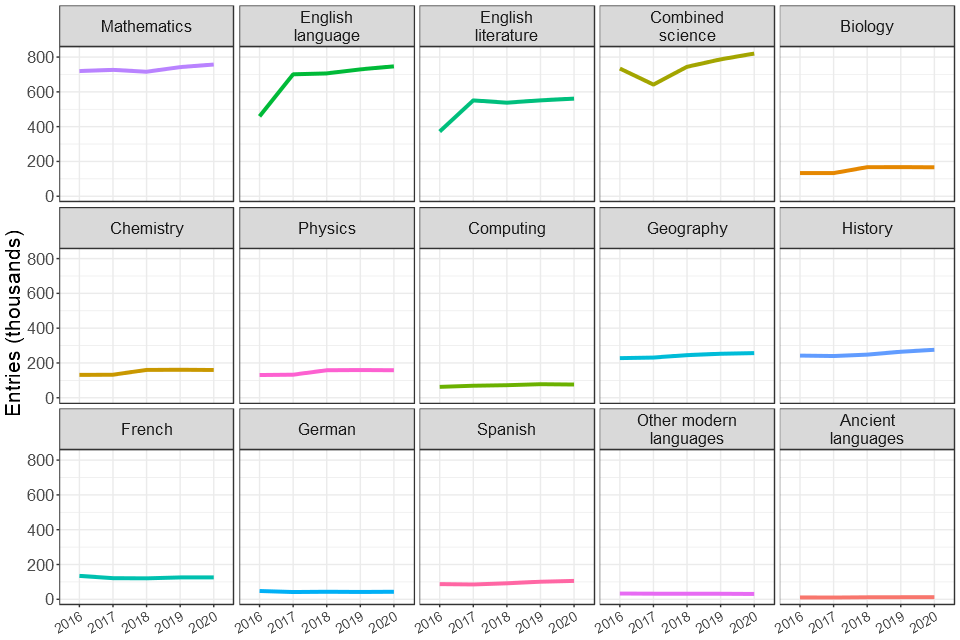
In all subjects, the majority of entries are from candidates in year 11, but the proportion of entries from candidates in year 10 and below in “other modern languages” is consistently higher than observed in other subjects. Entry patterns by year group are stable over time and this remained the case in 2020.
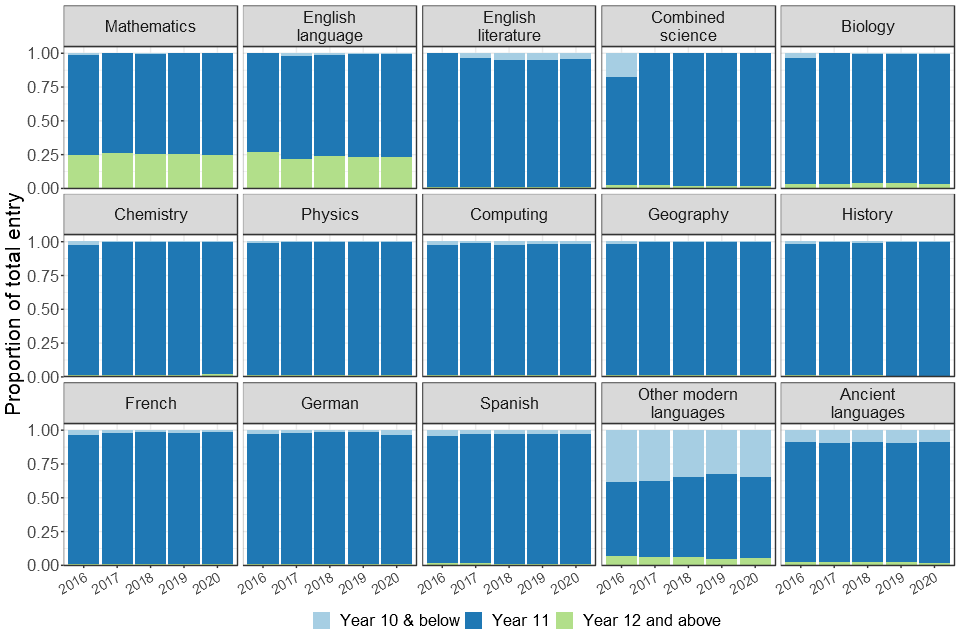
Changes in GCSE entries for non-EBacc subjects
Overall, entries in non-EBacc subjects increased slightly in 2020. The largest relative changes in 2020 were increases of 9% in both statistics and citizenship studies.
The graph and table below show the change this year in entries to non-EBacc subjects compared to 2019. The subjects are ordered by total entry size in 2020 (largest to smallest).
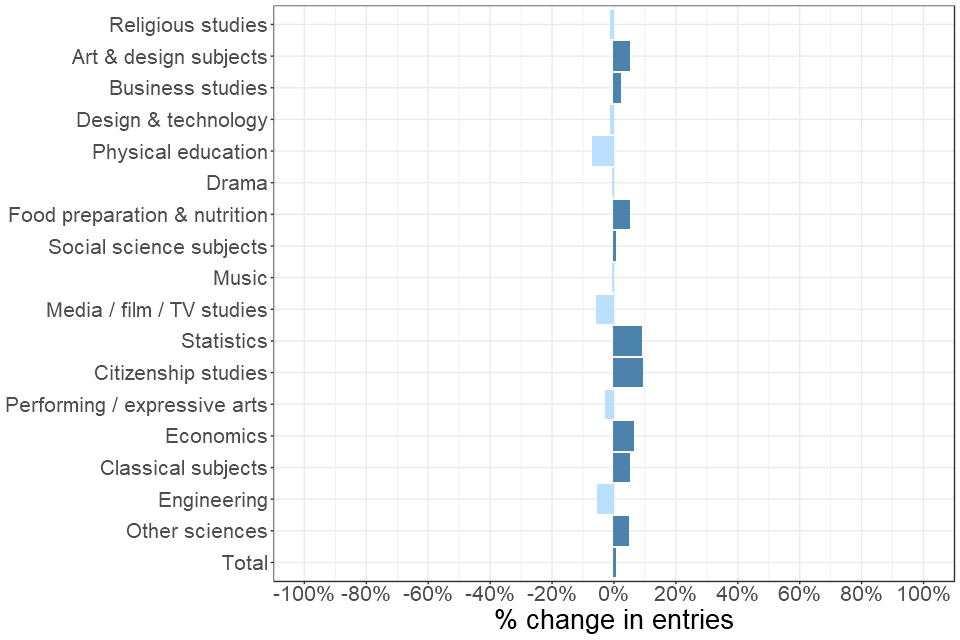
Note: ”All other subjects” is shown in the table below but not in the graph above due to the very small number of entries in 2019 (65 entries).
| Subject grouping | June 2019 | June 2020 | % change in entries |
|---|---|---|---|
| Religious studies | 251,140 | 248,340 | -1% |
| Art & design subjects | 184,060 | 193,035 | 5% |
| Business studies | 89,860 | 91,800 | 2% |
| Design & technology | 90,805 | 89,665 | -1% |
| Physical education | 80,665 | 74,995 | -7% |
| Drama | 58,255 | 58,000 | 0% |
| Food preparation & nutrition | 45,295 | 47,495 | 5% |
| Social science subjects | 38,355 | 38,560 | 1% |
| Music | 34,990 | 34,865 | 0% |
| Media / film / TV studies | 36,870 | 34,845 | -5% |
| Statistics | 23,720 | 25,845 | 9% |
| Citizenship studies | 20,425 | 22,285 | 9% |
| Performing / expressive arts | 9,335 | 9,085 | -3% |
| Economics | 6,145 | 6,525 | 6% |
| Classical subjects | 3,575 | 3,755 | 5% |
| Engineering | 2,990 | 2,830 | -5% |
| Other sciences | 2,600 | 2,725 | 5% |
| All other subjects | 65 | 0 | -100% |
| Total | 979,140 | 984,645 | 1% |
Entries for tiered GCSEs
In some subjects, there are two tiers of entry: foundation and higher. The graph below shows the entry by tier for the last 3 years for those reformed specifications which are tiered (except statistics which was awarded for the first time in 2019).
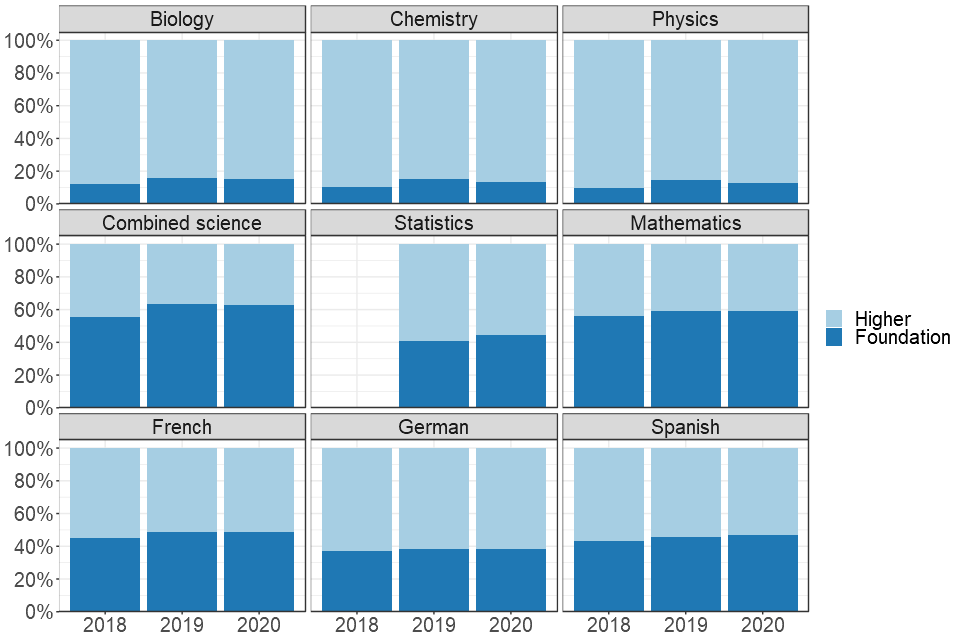
In most subjects, the proportion of entries to the foundation tier has remained stable in 2020 after increases in 2019 following advice provided to schools and colleges in light of evidence of some inappropriate tier entry in 2018 (see Ofqual’s blog).
AS and A level entries
The overall entry for A levels in summer 2020 decreased by 2% from 745,585 in 2019 to 731,855 in 2020. The decrease may reflect a decrease in the size of the overall cohort: ONS census data indicates that there are fewer 18 year olds in England in 2020 than in 2019 (599,393 compared to 618,873).
The overall entry for AS in summer 2020 decreased by 26% from 117,595 in 2019 to 86,970 in 2020. This drop in AS entries continues a trend caused by the decoupling of AS from A levels as part of AS and A level reforms.
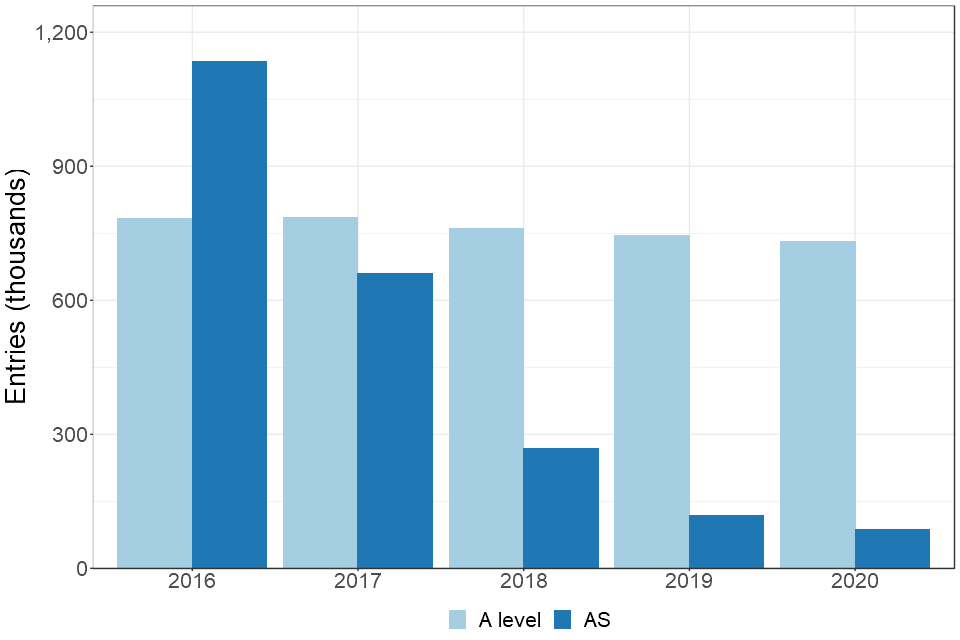
| Qualification | June 2016 | June 2017 | June 2018 | June 2019 | June 2020 |
|---|---|---|---|---|---|
| A level | 783,295 | 785,450 | 759,670 | 745,585 | 731,855 |
| AS | 1,135,605 | 659,880 | 269,090 | 117,595 | 86,970 |
| Total | 1,918,900 | 1,445,330 | 1,028,765 | 863,180 | 818,825 |
A level entries
Some A level subjects have increased in entry and other subjects showed a decrease. Overall, modern foreign language (French, German, Spanish) entries did not show much variation in the number of entries compared to last year, but entries in other modern languages decreased by 21%. Entries are higher in mathematics and further mathematics than in 2019 but biology, chemistry and physics all showed a slight decrease this year. Entries in history and geography both showed relatively large decreases (13% and 14% respectively), as did political and religious studies (both by 11%). Entries in computing increased by 11%.
The graph and table below show the change in entries this year compared to 2019. The subjects are ordered by total entry size in 2020 (largest to smallest).
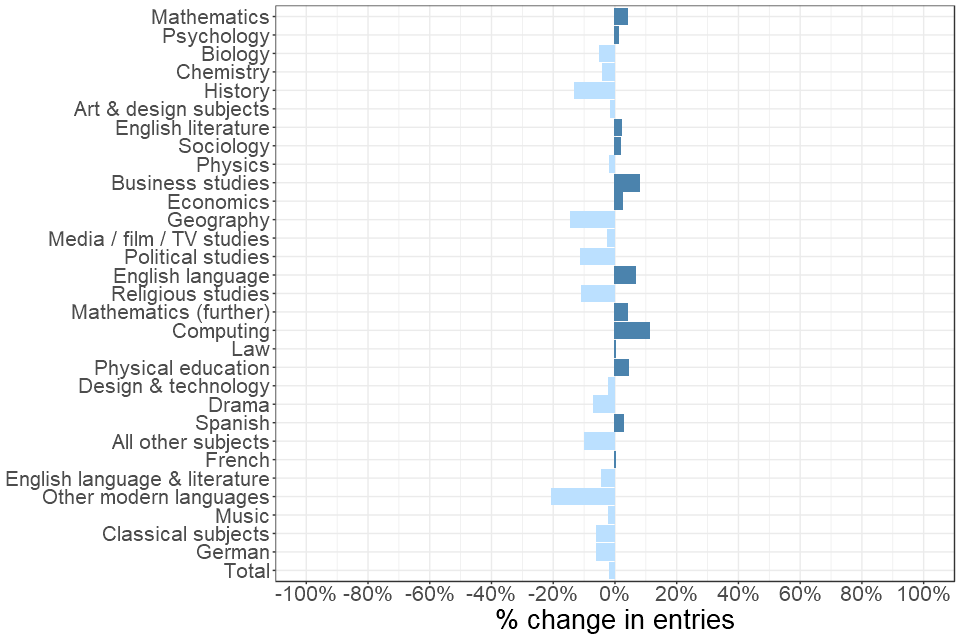
| Subject grouping | June 2019 | June 2020 | % change in entries |
|---|---|---|---|
| Mathematics | 86,185 | 89,730 | 4% |
| Psychology | 62,685 | 63,490 | 1% |
| Biology | 64,460 | 61,130 | -5% |
| Chemistry | 55,615 | 53,435 | -4% |
| History | 47,920 | 41,645 | -13% |
| Art & design subjects | 39,170 | 38,620 | -1% |
| English literature | 37,475 | 38,310 | 2% |
| Sociology | 36,295 | 36,965 | 2% |
| Physics | 36,420 | 35,740 | -2% |
| Business studies | 30,820 | 33,260 | 8% |
| Economics | 30,095 | 30,865 | 3% |
| Geography | 32,050 | 27,470 | -14% |
| Media / film / TV studies | 19,985 | 19,525 | -2% |
| Political studies | 18,495 | 16,455 | -11% |
| English language | 13,815 | 14,715 | 7% |
| Religious studies | 16,455 | 14,680 | -11% |
| Mathematics (further) | 13,920 | 14,475 | 4% |
| Computing | 10,550 | 11,730 | 11% |
| Law | 11,245 | 11,275 | 0% |
| Physical education | 9,905 | 10,355 | 5% |
| Design & technology | 9,375 | 9,185 | -2% |
| Drama | 9,320 | 8,685 | -7% |
| Spanish | 7,995 | 8,225 | 3% |
| All other subjects | 8,980 | 8,095 | -10% |
| French | 7,680 | 7,685 | 0% |
| English language & literature | 7,580 | 7,250 | -4% |
| Other modern languages | 8,035 | 6,385 | -21% |
| Music | 5,155 | 5,035 | -2% |
| Classical subjects | 4,995 | 4,700 | -6% |
| German | 2,905 | 2,735 | -6% |
| Total | 745,585 | 731,855 | -2% |
Change in A level entries for larger entry subjects
The graphs below show the change in entries from 2016 to 2020 for a selection of A level subjects with large entries in 2020. Entries in natural sciences decreased slightly after slowly increasing in previous years, whilst increases in social sciences also slowed. Entries in English (the aggregation of English language, English literature and English language & literature specifications) stabilised after decreasing in previous years.
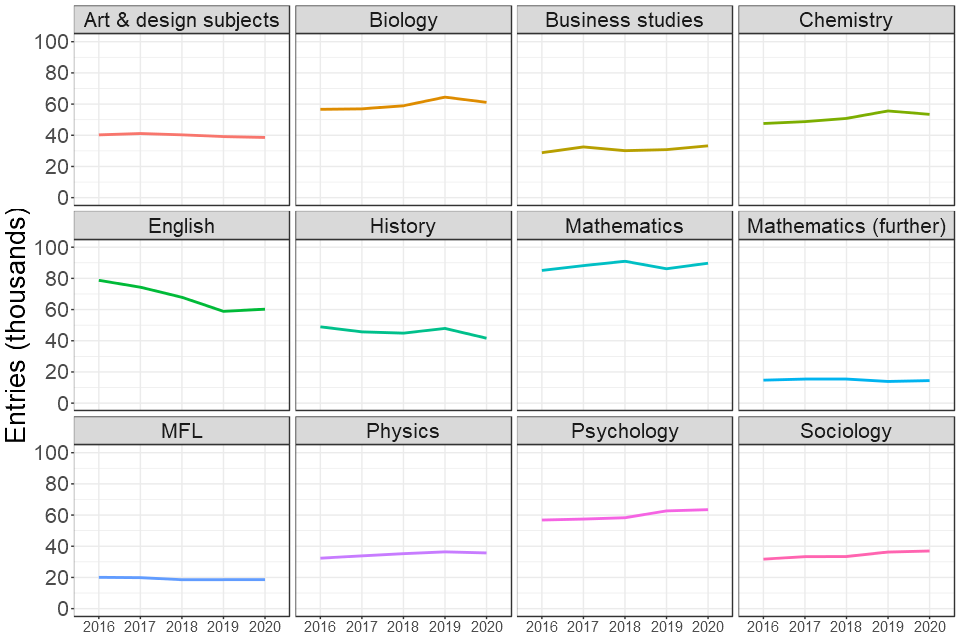
Note: In this chart, ‘English’ includes English language, English literature and English language & literature specifications.
AS entries
Entries in all AS subjects saw a substantial decrease this year (percentage decreases ranged from 8% to 37%). Overall, there has been a decline of 93% to 86,970 in 2020 from 1,331,955 entries in 2015, the last year before reforms of the legacy (pre-reformed) AS and A levels began.
The graph and table below show the change in entries this year (for larger entry subjects) compared to 2019. The subjects are ordered by total entry size in 2020 (largest to smallest).
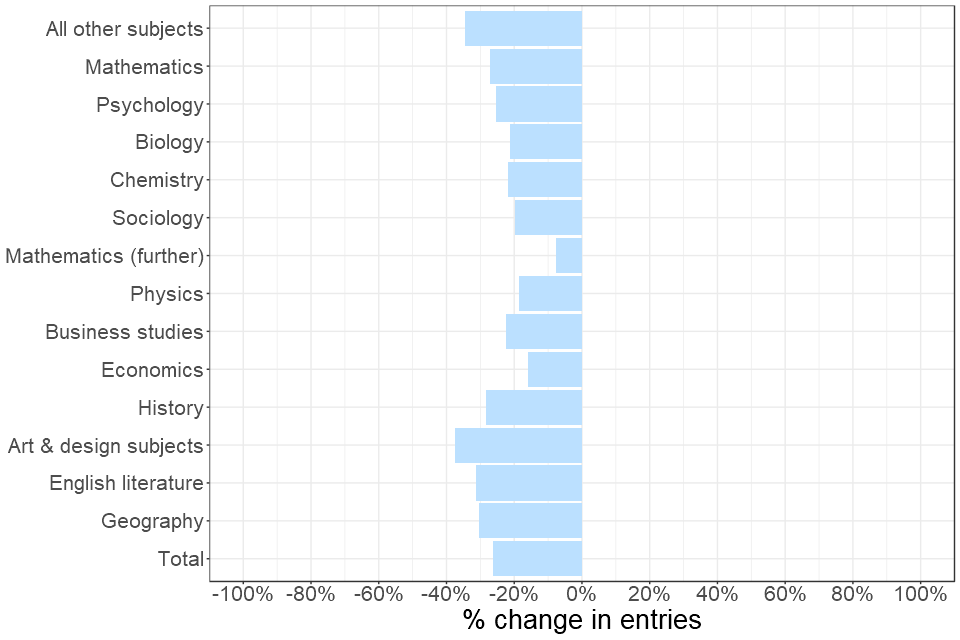
| Subject grouping | June 2019 | June 2020 | % change in entries |
|---|---|---|---|
| All other subjects | 26,255 | 17,215 | -34% |
| Mathematics | 17,190 | 12,550 | -27% |
| Psychology | 10,845 | 8,110 | -25% |
| Biology | 9,180 | 7,230 | -21% |
| Chemistry | 8,175 | 6,390 | -22% |
| Sociology | 7,415 | 5,960 | -20% |
| Mathematics (further) | 5,330 | 4,925 | -8% |
| Physics | 5,820 | 4,745 | -18% |
| Business studies | 5,315 | 4,140 | -22% |
| Economics | 4,300 | 3,620 | -16% |
| History | 4,995 | 3,585 | -28% |
| Art & design subjects | 5,160 | 3,230 | -37% |
| English literature | 4,580 | 3,160 | -31% |
| Geography | 3,030 | 2,110 | -30% |
| Total | 117,595 | 86,970 | -26% |
Entries by centre type
The graph below indicates the proportion of entries for each qualification by centre type. In all cases, the majority of entries are from secondary non-selective, maintained centres, followed by sixth form and further education (FE) establishments.
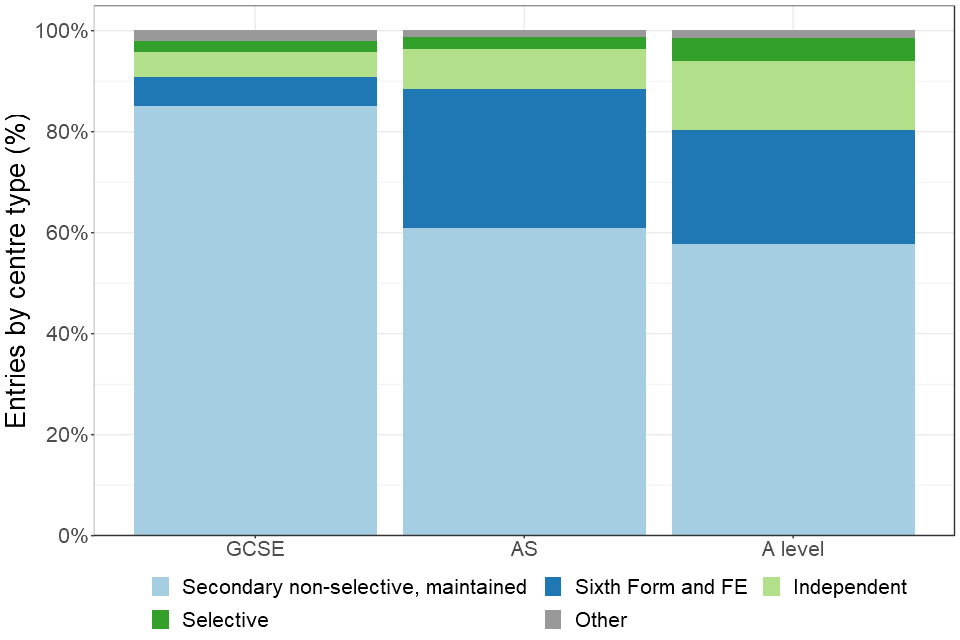
| Centre type | A level | AS | GCSE |
|---|---|---|---|
| Secondary non-selective, maintained | 423,560 | 53,065 | 4,498,255 |
| Sixth Form and FE | 165,210 | 24,015 | 303,420 |
| Independent | 100,640 | 6,905 | 266,905 |
| Selective | 32,735 | 2,050 | 111,590 |
| Other | 9,710 | 935 | 101,580 |
| Centre type | A level | AS | GCSE |
|---|---|---|---|
| Secondary non-selective, maintained | 58% | 61% | 85% |
| Sixth Form and FE | 23% | 28% | 6% |
| Independent | 14% | 8% | 5% |
| Selective | 4% | 2% | 2% |
| Other | 1% | 1% | 2% |
Background information
In this report, Ofqual presents data on the number of provisional entries for GCSEs, AS and A levels in England received by exam boards for the summer 2020 exam series.
Schools and colleges enter students with exam boards to take qualifications in the summer. The figures for entries can normally change up to the day of the exams. We collect provisional data at the same time every year, at a point when it should be reasonably complete, although final entry numbers may be slightly different from these. The figures presented here are the provisional figures as received by exam boards by 14 April 2020.
On 18 March 2020, the Secretary of State announced that the summer 2020 exam series would be cancelled in order to help fight the spread of the Coronavirus (COVID-19) and that students due to sit the exams would be awarded a grade based on an assessment of the grade they would have been most likely to achieve had exams gone ahead. Alternative arrangements will therefore be in place this year. However, the numbers of provisional entries summarised here represent the provisional entries taken at the same point in time as previous years. Centres were asked to finalise entries by 21 February 2020.
In this report, all figures for the number of entries are rounded to the nearest 5.
Background information accompanying this report includes factors which may have an impact upon the entries in summer 2020 as well as information on data collected for this release and definitions of important terms used in the report.
Data tables published along with this report give provisional entry data (rounded to the nearest 5) for different subjects broken down by year group for GCSE, AS and A levels.
User feedback
We welcome your feedback on our publications. Should you have any comments on this statistical release and how to improve it to meet your needs please contact us at data.analytics@ofqual.gov.uk.
Head of profession: Vikas Dhawan

